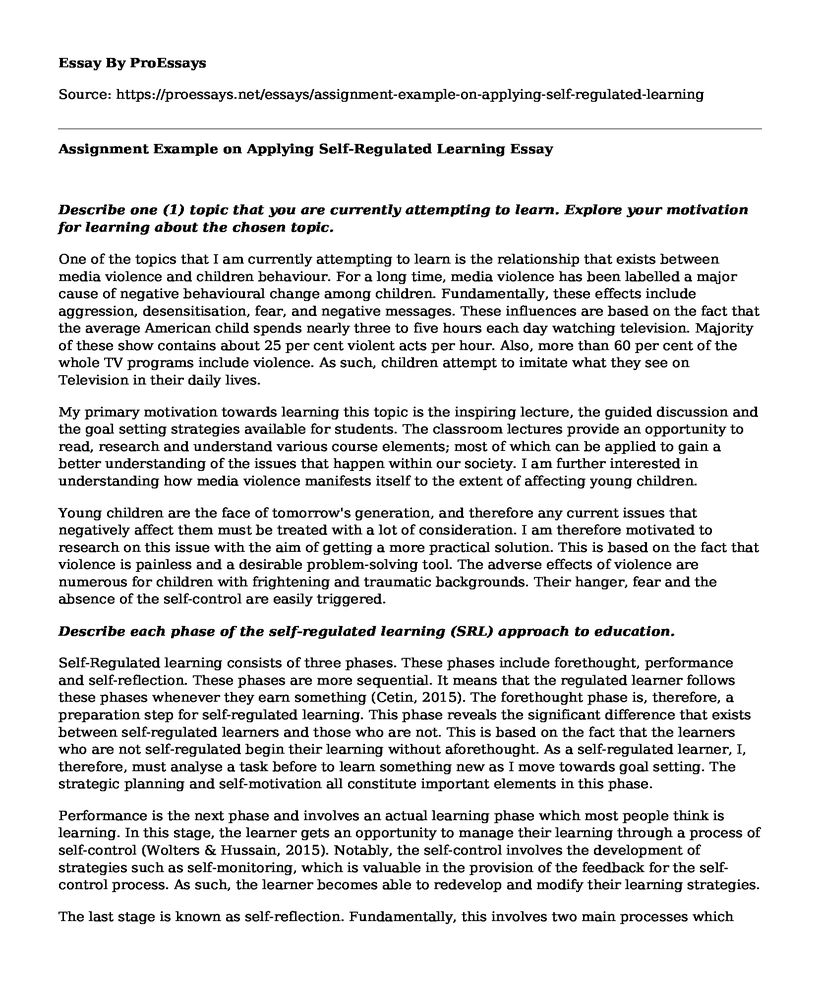Describe one (1) topic that you are currently attempting to learn. Explore your motivation for learning about the chosen topic.
One of the topics that I am currently attempting to learn is the relationship that exists between media violence and children behaviour. For a long time, media violence has been labelled a major cause of negative behavioural change among children. Fundamentally, these effects include aggression, desensitisation, fear, and negative messages. These influences are based on the fact that the average American child spends nearly three to five hours each day watching television. Majority of these show contains about 25 per cent violent acts per hour. Also, more than 60 per cent of the whole TV programs include violence. As such, children attempt to imitate what they see on Television in their daily lives.
My primary motivation towards learning this topic is the inspiring lecture, the guided discussion and the goal setting strategies available for students. The classroom lectures provide an opportunity to read, research and understand various course elements; most of which can be applied to gain a better understanding of the issues that happen within our society. I am further interested in understanding how media violence manifests itself to the extent of affecting young children.
Young children are the face of tomorrow's generation, and therefore any current issues that negatively affect them must be treated with a lot of consideration. I am therefore motivated to research on this issue with the aim of getting a more practical solution. This is based on the fact that violence is painless and a desirable problem-solving tool. The adverse effects of violence are numerous for children with frightening and traumatic backgrounds. Their hanger, fear and the absence of the self-control are easily triggered.
Describe each phase of the self-regulated learning (SRL) approach to education.
Self-Regulated learning consists of three phases. These phases include forethought, performance and self-reflection. These phases are more sequential. It means that the regulated learner follows these phases whenever they earn something (Cetin, 2015). The forethought phase is, therefore, a preparation step for self-regulated learning. This phase reveals the significant difference that exists between self-regulated learners and those who are not. This is based on the fact that the learners who are not self-regulated begin their learning without aforethought. As a self-regulated learner, I, therefore, must analyse a task before to learn something new as I move towards goal setting. The strategic planning and self-motivation all constitute important elements in this phase.
Performance is the next phase and involves an actual learning phase which most people think is learning. In this stage, the learner gets an opportunity to manage their learning through a process of self-control (Wolters & Hussain, 2015). Notably, the self-control involves the development of strategies such as self-monitoring, which is valuable in the provision of the feedback for the self-control process. As such, the learner becomes able to redevelop and modify their learning strategies.
The last stage is known as self-reflection. Fundamentally, this involves two main processes which include self-judgment and self-reaction (Cetin, 2015). A self-regulated learner in these stages, therefore, becomes able to self-evaluate himself through analysis of things such as thinking about what caused the success or failure of learning. Additionally, with the self-evaluation, the self-regulated learner can diagnose whether they achieved their learning objectives or not (Lin-Siegler, Dweck & Cohen, 2016). Most importantly, they can determine the level or degree of self-satisfaction.
Describe two (2) benefits and two (2) challenges that may be associated with self-regulated learning.
Just like any other type of learning, self-regulated learning has several benefits in addition to the challenges. The benefits, in this case, refers to the good things associated with self-regulated learning while challenges relate to the negative influences of self-regulated learning. One advantage of self-regulated learning is that students are in control of their learning process and can manage time to fit what suits them. Secondly, the students feel a sense of achievement and fulfilment when they accomplish goals they have set for themselves and therefore are more likely to establish a more challenging objective in future (Cetin, 2015).
The challenges of self-regulated learning also exist. Firstly, only a small number of students can become excellent self-regulators. This reason is based on the fact that there is a considerable lack of instructional processes that enhance self-regulated learning in the lives of the students. As such, not students can demonstrate the elements that support self-regulation. Additionally, if a person happens to experience failure and reduced self-efficacy, then the chances of having his abilities and desire to self-regulate to reduce are very high. As such, individuals who want to demonstrate self-regulation learning must use a well-structured mechanism, which mostly involves the adoption of the elements that constitute to self-regulation learning. As such, they will be able to achieve their goals, which could be simple or complex and which could be easily converted into successful outcomes.
References
Cetin, B. (2015). Academic Motivation and Self-Regulated Learning in Predicting Academic Achievement in College. Journal of International Education Research, 11(2), 95-106.
Lin-Siegler, X., Dweck, C. S., & Cohen, G. L. (2016). Instructional interventions that motivate classroom learning. Journal of Educational Psychology, 108(3), 295.
Wolters, C. A., & Hussain, M. (2015). Investigating grit and its relations with college students' self-regulated learning and academic achievement. Metacognition and Learning, 10(3), 293-311.
Cite this page
Assignment Example on Applying Self-Regulated Learning. (2022, Nov 16). Retrieved from https://proessays.net/essays/assignment-example-on-applying-self-regulated-learning
If you are the original author of this essay and no longer wish to have it published on the ProEssays website, please click below to request its removal:
- Parental Care Essay Example
- Critical Thinking: Stop and Frisk
- Student's Well Being Quantitative Study Paper Example
- Personal Statement on University of Westminster
- Essay Example on Natural Consequences: A Guide for Teachers
- School Uniforms: Striking a Balance in Debate - Essay Sample
- Essay Example on Parents Helping Kids Find Their Strengths for Career Choice







